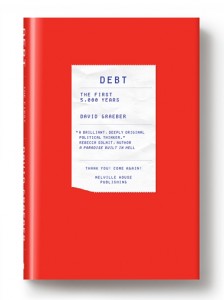Yesterday, along with Stephen Colbert, I had a little fun with the Occupy Wall Street protests. Enjoying Colbert’s humor by no means throws me in with the camp of the “unconcerned” who perhaps think these protests are a complete waste of time.
Instead, line me up with the folks who say, “Houston, we have a problem.” And though I can quote Catholic teachings on private property, private enterprise, etc., all day long (and I’m hungry to learn more), I haven’t exactly shied away from sharing blunt facts on the wide disparities American citizens have endured over the last 35 years.

A little over two months ago, I shared some thoughts with you about the Old Testament concept of the Jubilee, written by the author of the book on the history of debt you see above. That fellow is named David Graeber, and what follows is an interview he gave recently with Kevin Depew, former Editor-in-Chief of the financial infotainment website Minyanville.
It turns out that Graeber became involved with the Occupy Wall Street movement shortly before I posted his thoughts on the Jubilee back in August. Since then, the movement has spread to over 1200 cities ’round the globe. This interview, which was just posted today as a podcast, as well as via transcript, may be of interest to you.
Because certainly, something is rotten in the state of Denmark . Otherwise, we wouldn’t be interested in Greek debt default fears and “what it all means.” Spending a few minutes with Depew and Graebel, with a commitment to doing so with softened hearts and open minds, may help clarify a few things about the Occupy Wall Street movement for you. I’ll turn it over now to Kevin Depew.
****
“Money is the root of all evil” – so goes the old adage. In today’s hyper-connected globalized market, a more accurate aphorism might be “debt is the root of all evil.” We see this in the crushing Greek and American sovereign debt, in the housing market where scores of homeowners are being foreclosed upon because they are unable to pay their mortgages, and in the amount of loans students have to take on to go to college these days – all of these different debts threaten to take down the house of cards that is our hyper-connected global financial market.
But why is it that when countries in bad shape restructure debt or when corporations drowning in debt declare bankruptcy, they are applauded, but when you and I fail to pay up on what we owe to banks or when we become bankrupt, it is seen as a moral failing? That’s the paradox David Graeber explores in his new book, Debt: The First 5,000 Years.
Kevin Depew
Okay, I’m Kevin Depew from Minyanville and joining me on this podcast is David Graeber, author of the new book, Debt: The First 5,000 Years. Welcome, David.David Graeber
Thanks.Kevin Depew
Now, just in a way of providing some of your background for our listeners. David teaches anthropology at Goldsmiths, University of London and has written numerous books on a wide range of anthropological and economic topics. He’s written for Harper’s, The Nation, [Mute] and the New Left Review, and you’re frequently introduced by the media as a, quote, “activist and anarchist,” end quote. How’s that for an introduction?David Graeber
Well, that’s more or less right.Kevin Depew
Okay. Well, David, I want to talk to you about Occupy Wall Street, of course, and what’s happening with this global movement. But business first. Your book, Debt: The First 5,000 Years, tell me about how the book came about.David Graeber
Well, I’d been actually, in a way, it emerges from my involvement in other activist projects. I was involved for many years in the global justice movement and one of the big issues there was the Drop the Debt campaign, structural adjustment policies, all those things that we’re really mobilizing against were enforced through debt.And one of the things that really fascinated me was the moral power of the idea of debt. I would tell stories to people, very sympathetic people, liberal lawyers, well-meaning do-gooder types, and you’d tell these stories about horrible things. You know, in Madagascar, for example, the IMF came in with these policies, you have to cut the budgets because, god knows, we can’t reduce the interest payments you owe to Citibank (C), they owed all this money. And they had to do things like get rid of mosquito eradication programs, as a result that malaria returned to parts of the country where it had been wiped out for a hundred years and tens of thousands of people died and you had dead babies being buried and weeping mothers. I was there, I saw this sort of thing. You described this people and the reaction would be, well, that’s terrible, but surely people have to pay their debts. You’re not suggesting they cancel it or default, that would be outrageous.
And it seems like, it’s hard to imagine any other issue where people try to come up with excuses for doing things that would kill 10,000 babies. But here they were doing it.
So what is that strange, moral power that the idea of debt has over us that seems to trump any other form of morality. That’s one of the questions that I was trying to answer in the book.
Kevin Depew
If I can just read a couple of sentences from the book, because…David Graeber
Sure.Kevin Depew
I was fortunate to get it earlier in the spring when your publisher sent me a review copy. And it really is a fascinating book, so I’ve recommended it to so many people, because it’s a completely different way of looking at debt and most of us, especially in the financial media, were used to approaching this from within the structure, within the framework we deal with and looking at it in pure economic terms when you bring this other, anthropological attachment and approach to it.If I could just, these are a couple of sentences from the book and this is near the end, I don’t think it gives much away, but it touches on exactly what you just talked about. And this is David writing, quote:
“It seems to me that we’re long overdue for some kind of biblical-style jubilee, one that would affect both international debt and consumer debt. It would be salutary, not just because it would relieve so much genuine human suffering, but also because it would be our way of reminding ourselves that money is not ineffable, that paying one’s debts is not the essence of morality. That all these things are human arrangements and, if democracy is to mean anything, it is to the ability for all to agree to arrange things in a different way.”
End quote.
Now, I read that because it touches on, how did we get to this point where debt indeed became this—it goes on, at least until recently with Occupy Wall Street, it goes without question that it’s a code of morality that we have to live up to. How did we get to this point?
David Graeber
It’s a really interesting question and the best answer I could come up with, after surveying 5,000 years of religious texts, moral texts, economic texts, political texts, pretty much everything there was to bring to bear on the subject, was it has a lot to do with war and violence.The very origins of money have, certainly coins, have much more to do with war mobilization, states conquering places, than they do with actual trade, which tended to be conducted as credit arrangements, but were inherently more flexible than the ones we have today. That sort of inviolability comes more from the process of shaking people down than from the process of actually people making deals and arrangements with one another.
And there’s a stream—so that very morality of debt has a lot to do with it. For example, in almost all the great world religions, they talk about debt as if paying your debts is morality. In fact, even the word for debt, sin and guilt are often the same. That’s true in Sanskrit, that’s true in Aramaic. The Lord’s Prayer doesn’t actually say, “Forgive us our trespasses,” it says “Forgive us our debts just as we forgive our debtors.” Of course, the trick is, you don’t actually forgive your debtors, do you?
Read the rest, and more stories on the OWS movement, over at Minyanville. Also, interesting discussions over at Mark Shea’s place.












